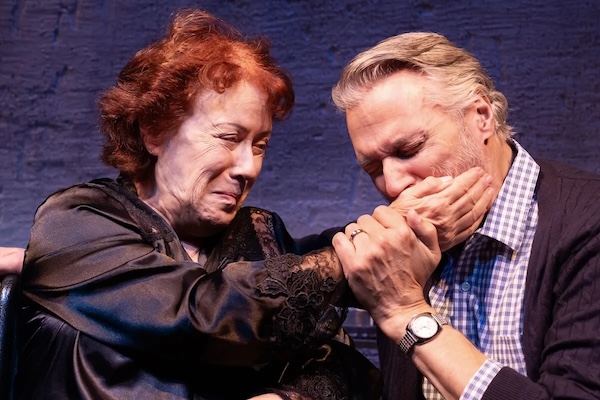Theater Review By Ron Fassler . . . .
One of the main tenets of drama is conflict. Hell, it’s the tenet. In choosing death as the overriding theme of her new play, Elizabeth Coplan unceremoniously tramples on well-trodden territory. In ‘Til Death, now playing off-Broadway in a limited run through December 23rd, Coplan’s interest in the matter clearly occupies her writing since her bio mentions how she has “turned her personal loss into the groundbreaking play cycle Grief Dialogues,” then mentions her “award-winning play Hospice: A Love Story.” It’s admirable to turn one’s life traumas and expand them into different takes on the many stages of death; it’s another to make a cottage industry out of it. That’s not a judgment, it’s just that you had better have a good deal of original things to say on a subject that… well, has been done to death.
The 75-minute play is short on length but long on being tiresome in its exploration of one family’s dealings with a matriarch who is dying of cancer. When we first meet Mary, she is a 75-year-old woman with a doting second husband Michael, who appears devoted to her. It’s a birthday party and a celebration seems to be in order as Mary is apparently doing well following a nasty bout of chemo. Her son Jason is there, as are her two daughters, Anne and Lucy, as well as Lucy’s teenage son, Nick. Across a series of scenes, we find out later that Mary’s cancer has aggressively returned with the discussion moving into end-of-life scenarios and assisted suicide. All well and good except the playwright can’t resist adding melodrama seemingly at every turn. Backstories are not so much investigated as front stories, in that we mostly get confessionals about what is ailing everyone individually, be it confessions of sexual abuse, alcoholism denied, interlopers with an eye on Mary’s substantial financial legacy and a last-minute out-of-the-blue plot point that crashes in on the proceedings hoping for an “aha!” moment, only to snuff out any semblance of believability.
With so much juggling going on things get lost in the shuffle. The assisted suicide plot line, which it seems will be the play’s overall arc, goes missing at one point. Are we to think this was dropped when Mary’s cancer returns to finish the job? It’s never stated. The logic behind certain character motivations is muddled as well. Why does Lucy drink so much? She’s just angry and vile to everyone most of the time which is both alienating and unpleasant. There’s no tension in the marriage of Mary and Michael, but everyone seems to think Michael is bad for her. Why? The loose threads unravel any semblance of truly caring about these people as they deal with the very real issue of losing a loved one. We’ve all been there. It’s tough stuff and Coplan cares about how it affects her characters but fails in translating that into why we should.

The actors do their best. It’s always a pleasure to see such pros as Judy Kaye and Robert Cuccioli onstage. I found it a little difficult to reconcile seeing Kaye play a woman in her seventies, as it still seems like yesterday she was movie star Lily Garland in the musical On the Twentieth Century some forty-five years ago. She brings a well-lived life with her to the proceedings and seems incapable of a false moment. Cuccioli matches her in style and muted elegance, pulling off his “dad jokes” and remaining strong in the face of the invective he has to handle from eldest daughter Lucy, who never stops pummeling him for reasons that essentially go unexplained. Taking on the part of Lucy, Amy Hargreaves is saddled with such an unappealing character that it is impossible to judge her acting on the merits. Michael Lee Brown (Nick), Whitney Morse (Anne) and Dominick Laruffa Jr. (Jason), all do their best with their thinly defined parts.
Chad Austin, Producing Artistic Director of the Abingdon Theatre Company, which is presenting ‘Til Death, directs in a straight-forward style that allows the actors to do their thing. Working in the confines of a small playing area, he is to be credited for keeping claustrophobia at bay when all six actors are onstage together. And he does keep the performances tight. But as a dramaturg, he allows the playwright to indulge in twists and turns that don’t heighten the drama, but merely create a flailing for attention.
Production credits are solid with nice black and white projections of family photos designed by Lisa Renkel put to good use during scene transitions. The set is a bit odd in that the furniture is very base considering how wealthy we learn Mary is. It’s understandable budget constraints prevent anything elaborate, but it doesn’t take much in terms of props and a smart chaise or chair to indicate prosperity and taste. Antonio Consuegra’s costumes and Dawn Chiang’s lighting are just fine, though there is an obtrusive sound design, less the problem with how Jesse Starr manages the task, but more the province of why the director and playwright feel it necessary to pump music throughout the entire play’s running time. It never lets up in the background from start to finish and it’s a good thing it’s only dialed to about “2.” I half-expected someone in the audience to shout out, “Someone left the radio on!”
‘Til Death is playing at Theatre Row, 410 West 42nd Street now through December 23rd. For further information, please visit https://bfany.org/theatre-row/shows/til-death/
Photos: Julieta Cervantes


















